
Hi Archinect!
I'm at the Media Lab for a talk with Tom Stocky, Director of Product Management at Facebook. His presentation is called "Design, Hack, Ship: How we build products at Facebook," and it was billed as offering "a glimpse into what happened behind the scenes of the initial News Feed launch, Timeline (the new profile), and a handful of other key product changes."
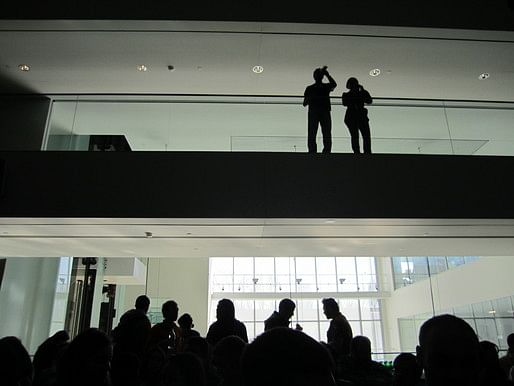 [The Media Lab's atrium space, by Maki and Associates.]
[The Media Lab's atrium space, by Maki and Associates.]
This semester, I'm in a seminar with Peter Galison (History of Science) and Martha Minow (Law) called "Digital Self," and the identify and privacy issues around Facebook are something we've been talking about. So I thought it would be interesting to get some insight into this.
Plus, it's always nice to take a break from the GSD's free food in favor of someone else's free food (which, I must say, is quite tasty: shrimp pizza).
12:05: Tom Stocky introduces himself. No preliminaries. He's a Media Lab alum. Fast talking, casual, peppy guy.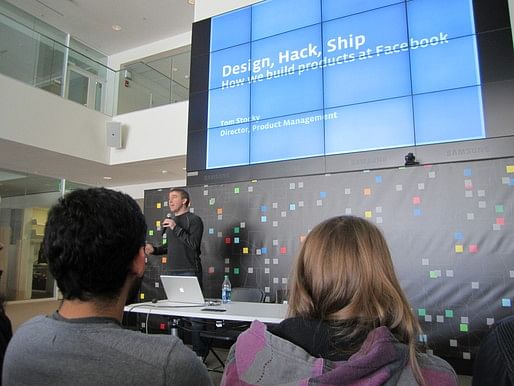
The talk is organized around some principles that guide FB's process. These aren't recommendations, just what they do.
First principle: designing around people.
The 1995 Facebook profile page was pretty basic, but people would frequently change their profile pic to show recent shots of themselves (drinking, wearing costumes, etc.). So FB added photo album capability, and then the ability to tag photos. Tagging was key, and made Facebook was the biggest photo site on the web at the time.
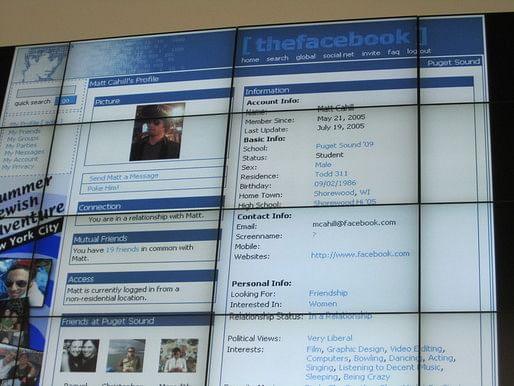
["thefacebook" profile page, circa 1995.]
Second principle: Hack.
This is so important that when they moved buildings, they had the city change the name of the street so that their address could be "1 Hacker Way." [Not sure if irony was intended there.] Hacking here doesn't refer to illegality, but to the idea that you should prototype and iterate instead of sitting around and debating: "code wins arguments."
Example: Facebook's chat function was developed in a short time at one of their Hackathons, an all night coding event (starting at 8pm with takeout food) that almost the whole company attends. They get Crispy Creme donuts or chicken nuggets at midnight, keep working until dawn (pancakes?) and the goal is to have something to launch by the morning. This "launch" is done through their "GateKeeper" which lets them launch to just employees, or just people in a certain geographic area or with certain other characteristics.
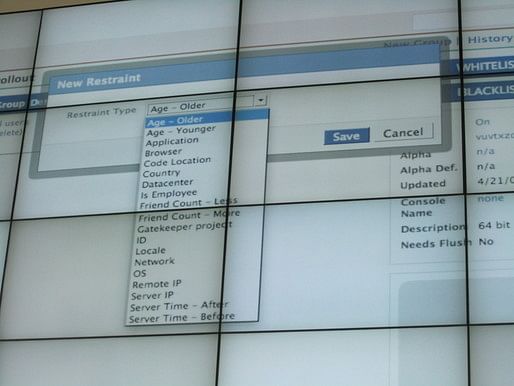
[Gatekeeper.]
Third principle: Solve the root cause.
Example: People used to visit certain friends' profiles often. FB realized that the idea was that people wanted to see what was different or new in their friend's profiles and lives. They could have made it faster to scroll through profiles, but instead they came out with News Feed, that just highlights updates--controversial at first, but now highly accepted and used.
Fourth principle: Keep it simple.
Stocky refers to Steve Jobs' "art of saying no." They don't want to just keep adding new features and letting people pick whether to use them or not. This would lead to clutter.
Example: When FB started launching in other countries, it went against common logic that you could use the same site in different places. But because the site is simple, a post is pretty much the same in one language or another.
Example: Stocky shows two screenshots of his profile: one showing everything, and one with all of the user-uploaded content [and focused advertisements, I think he neglects to mention] deleted. There's not much left: most of the Facebook experience is interfacing with your friends, not with Facebook itself.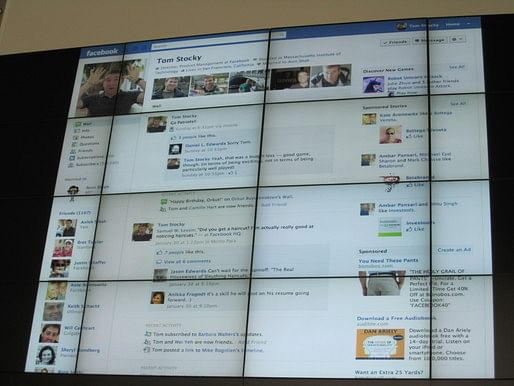
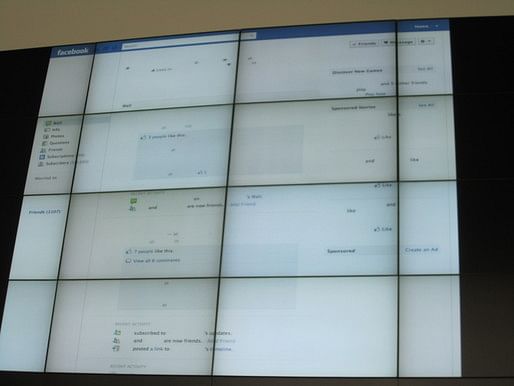
[The lower image here shows all user content deleted.]
Fifth principle: Be bold. Take risks or get left behind.
Stocky refers to Wayne Gretzky's motto to "skate where the puck is going, not where it's been." [Holler to Edmonton!]
Example: Timeline. FB thought that the current (pre-Timeline) profile page doesn't really tell the story they want to tell. Decided to go back to first principles and build it up again. It's hard to throw away the old profile page, because they had invested so much in it. "But what you're throwing away is the end result, not the process and all the learning around the way." Now he's showing this promo video about Timeline. [It makes me a bit queasy to see the way this advert condenses and celebrates a life as a straight-forward process of proceeding through milestones and reproducing.]
"I think it's a really beautiful product. It has a lot of usability issues that we're working through," but they're working through them incrementally. Stocky is happy that the company is taking risks.
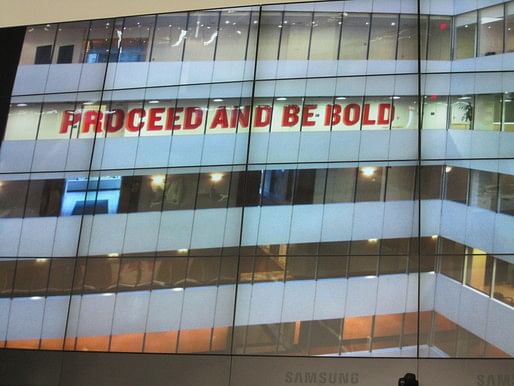
[Facebook's NYC office.]
Question time.
Question from the back: Would these bold changes have been possible earlier in FB's history? They have so many users now and their users aren't going to go anywhere [implying that the risk is lower now].
Answer: News Feed was bold and very controversial, so they've made big changes before. When FB groups like "A Million Strong for the Old Facebook" got going, the ironic thing is that these movements gained their momentum through News Feed. People learned to hate News Feed by using News Feed.
Stocky also argues that the stakes are actually higher now for FB.
Another question, about what the Product Manager does.
Answer: Lots of things. ..."People say that engineers and lawyers should never be in the same room." Part of his job as Product Manager is mediating between these different parties.
Question about how FB changes how we live.
Answer: [Yes, they are interested in this.] The real interest for Stocky and many others at FB is about how FB is a piece of social infrastructure. "In everything we're trying to design, if other companies are successful in doing [similar things], we're happy about that," because these things feed on each other. [Stocky doesn't really answer how he thinks FB has changed how we live or how they aspire to change it.]
Question about whether FB is interested in hardware. Example: a "like" button.
Answer: No. But they like creating the platform that allows other people to build this.
Question: Why is there no dislike button?
Answer: "We debate this a lot at FB." It's not very positive to be disliked. But there is "unlike." Some people "like" something, so you get the notification, then "unlike" it to show that they actually don't really like it. [laughter] "We like to facilitate positive interactions."
Question: What are the challenges you face by dealing with engineers?
Answer: Well, I am an engineer, so I take offense to that. [laughter] But engineers often fall in love with what they make, and usually it's the PM's job to say "no, that's stupid." And that's a hard conversation to have. Also, engineers call you out on bullshit, if you're making assertions that aren't backed up.
Question: With the IPO coming out, and with all the articles in the NYT about privacy, how does FB talk internally about privacy and how does that compare with your experience at Google [where Stocky was before FB]?
Answer: I'm not even going to touch the last one [about Google]. But the person with a profile has control over who they share things with--everyone, or their friends, or a subset of friends. It's for privacy, but also, the more you give someone controls over privacy, the more they end up sharing in the end. A lot of the things people complain about on Facebook are things that you can do in the real world, such as spray-painting someone else's phone number on a bathroom stall.
Question about Hackathon; how are things deemed successful?
Answer: There are some ways to measure whether people like things. But much of it is using things themselves and seeing how it feels. They do one-way mirror studies, anthropological studies where they observe people in their homes, and use GateKeeper, so they have a variety of tools.
Question about PMs and team organization.
Answer: Any given product has a core set of engineers, a PM (etc.), and a PM will usually work on multiple projects. They encourage lateral movement; if someone has been on a project for 18 months, they would often move. Before Stocky's time, they entire company would work on one project at a time, so they're used to moving around.
Question [from me] about privacy: You answered the question about privacy relative to other individual people, but what about privacy relative to Facebook or data mining companies, etc.?
Answer: All FB employees are avid users of the site, we care about privacy too. FB doesn't sell data about people. They do targeted advertising, when they can allow companies to have their ads appear when you post or have information about certain things. But the companies never have your individual information.
Follow-up [from me again]: And governments and law enforcement agencies?
Answer: We abide by the laws in each country. if there is a request that we think is too broad we don't always honor it, but we follow the laws in each country.
Question about identity.
Answer: There are all the people, things, and places important to you. "In the ideal world, we would give you a way to connect to every thing that is important to you." So we need to know what those things are and have a spot for them in the graph, and we need to give you ways to share your connections in ways that you want to.
Question: What is a typical life cycle of products, and how do you know when a product needs to be replaced?
Answer: When a product is launched, there's already someone in the company who hates it, and generally over time the number of people who think this increase, until a tipping point where they decide to take a look at it. When usage drops off, that's another sign. For example, on the earlier profile, people who joined later didn't have information about earlier times in their life.
Question: As FB embeds itself deeper and deeper into our social interactions, will there ever be shared governance or will it always be led top-down?
Answer: To summarize the question it was whether FB would ever [become democratic] or whether it would always be a kind of "dictatorial regime screwing around with your life. Is that a fair summary?"
Questioner: "Pretty much."
Answer: There's a lot of things embedded in that question; I'd challenge some of the assumptions. FB doesn't have much influence or control over your life unless you let it. The way people express your opinions is that they either use it or they don't. If people don't like things and don't use them, then those features go away. And FB listens if there are groups and movements against certain changes. Not because they're good Samaritans but they want people to use their products.
"I'll be hanging out around here, if anyone wants to talk about dictatorial regimes or anything else." [Applause.]
Thanks for reading!
Lian
P.S. Unfortunately this means that I'm missing a conversation between Peter Walker and Charles Waldheim right now back at the GSD, but I figure that they're taping that one.
P.P.S. Philip Glass has his 75th birthday this year, as does the GSD, so tonight he's performing and giving a talk in Piper! I waited in line earlier this week and was rewarded with a ticket!
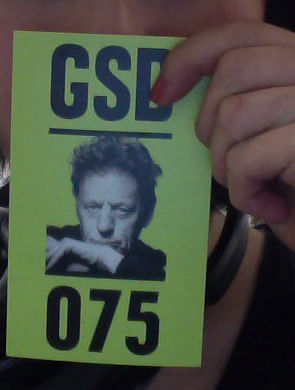
This blog was most active from 2009-2013. Writing about my experiences and life at Harvard GSD started out as a way for me to process my experiences as an M.Arch.I student, and evolved into a record of the intellectual and cultural life of the Cambridge architecture (and to a lesser extent, design/technology) community, through live-blogs. These days, I work as a data storyteller (and blogger at Littldata.com) in San Francisco, and still post here once in a while.



3 Comments
This is awesome, thanks for sharing Lian! Your blog almost makes me want to go back to school
Didn't anyone ask Tom what he'll be worth when Facebook goes public? :)
Thanks, Paul! Nobody asked that. :)
I should have asked about how he would like to see FB and other media change the way we live! Of course he was going to give a by-the-books answer on the privacy question, so that was kind of a waste.
Someone from the Media Lab also blogged this event, with better coverage of the Q+A.
Block this user
Are you sure you want to block this user and hide all related comments throughout the site?
Archinect
This is your first comment on Archinect. Your comment will be visible once approved.